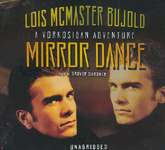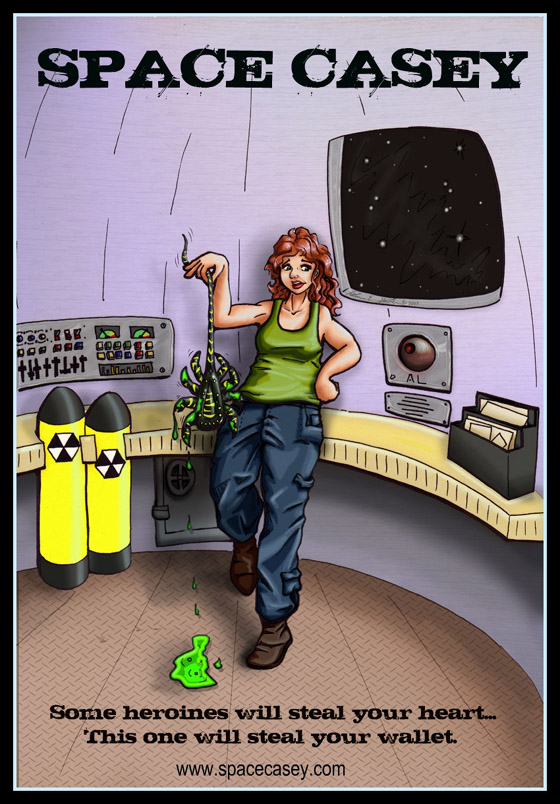

 Calculating God
Calculating God
By Robert J. Sawyer; Read by Jonathan Davis
Audible Download – 12 hours – [Unabridged]
Publisher: Audible Frontiers
Published: 2008
ISBN: None
Themes: / Science Fiction / Aliens / Paleontology / Religion / Philosophy / Space Travel /
One of the things I enjoy most about reviewing audiobooks is that I get to revisit novels that I’ve read and loved in the past. When these beloved novels are given great readers (not always the case), I can’t wait to get at them. Calculating God is one of those novels, and Jonathan Davis is an excellent narrator, so this audiobook leapt to the top of my TBR list the moment I realized it existed.
Jonathan Davis burst onto the science fiction scene with his stellar narration of Neal Stephenson’s Snow Crash (SFFaudio review here). Since then, in the science fiction genre, he’s been almost exclusively reading Random House’s Star Wars abridgments. He reads them well, but I was thrilled to see him step away from that and narrate another of science fiction’s great novels. He is one of our very best narrators and this is a fine performance. I was rapt the entire time, and even near tears at one moment in the book.
When I read this novel for the first time, I was a bit taken aback. I am a Catholic and I’ve been reading science fiction all of my life. I have never had a problem reconciling science and religion and have been both perplexed and dismayed that Christianity is portrayed so often as being incompatible with science. It’s certainly true that for many Christian churches this conflict is real, but those churches are not Catholic churches, despite the most famous illustration of the conflict being the Catholic treatment of Galileo. I tell everyone who cares that Galileo was an aberration in the history of the Church (not the norm), but still, it was a colossal (though admitted) mistake. But for myself, science and religion are NOT in conflict. I’ve included a link at the bottom of this review to an interview of Brother Guy Consolmagno, a Vatican astronomer that aired on CBC Radio as an illustration of a Catholic’s relationship with science. Robert J. Sawyer is mentioned in the interview as well.
Back to the novel at hand: The reason I was taken aback when I first read this book was that it’s the first novel I’ve ever read in which the aliens believe in God. That in itself makes this book interesting enough to pick up. Imagine – an alien lands on your front doorstep and starts to question your doubts about the existence of God. Most science fiction portrays religion as something that is grown through or evolved past. By the time an alien species is mature enough for stellar travel, surely they have jettisoned religion? There’s no place for such a thing in a rational, scientific universe. Right?
Well, not according to this novel. Sawyer presents, in a very entertaining and interesting way, arguments for and against God’s existence. The main character (Tom Jericho) is a paleontologist who is dying of cancer. An alien (named Hollus) lands near the Royal Ontario Museum and strolls right in, asking to see the fossils. And off the novel goes. Jericho and Hollus spend much of the novel together looking at fossils and discussing various topics that range from the wide, including mass extinctions and evolution, to the intimately personal, like the approaching death of Jericho. I can think of no better way to present these topics than this lively novel, and I’ll recommend it to anyone interested in thinking about these things, no matter which side of the fence they are on.
Sawyer uses science fiction to create circumstances that make us readers think about important ideas in different ways and from different perspectives. That’s exactly the kind of science fiction I love to read, and why I’ll keep coming back to Robert J. Sawyer for more. I’m very happy to have had a chance to revisit this novel, and even happier to be able to award it our SFFaudio Essential designation.
Audible.com has published a few more of Robert J. Sawyer’s novels: The Neanderthal Trilogy is there (Hominids, Humans, and Hybrids). They also have his Nebula winning novel The Terminal Experiment, published by Recorded Books. We reviewed it back in 2003.
Robert J. Sawyer’s Calculating God page: LINK
A link to a CBC interview of Brother Guy Consolmagno, Vatican Astronomer: LINK
Posted by Scott D. Danielson





